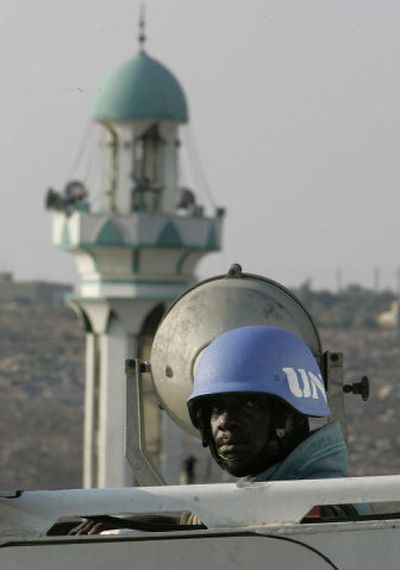‘People thought they were safe’

QANA, Lebanon – The bulldozer slowly clawed at the rubble Sunday, its motions gentle for a machine. In its path were what was left of life: a bag of onions and can of beans, a dirt-crusted sandal, a baby bottle, a plaid bag with a diaper still tucked inside and a punctured picture of a young boy, posing awkwardly, his arms stiff at his side.
As the sun arced overhead with Israeli shelling thundering in the distance, the shouts went out: “Stop! Stop!” Rescuers surged; then one emerged, his back slightly stooped.
Cradled in his arms was the 27th victim pulled from a partially buried room that had sheltered 63 people in the village of Qana. The victim’s name was Abbas Hashem, and he was 1 year old. His blue pacifier still dangled from his green tank top.
Behind the pair was a book, tossed by the blast into a splintered olive tree.
“The Keys to Heaven” was its title.
Tragedy visited Qana again on Sunday, a once-picturesque southern Lebanon village of figs, grapevines and olive trees along rolling, rocky hills where Lebanese believe Jesus Christ turned water into wine for a wedding.
It was here on April 18, 1996, that 106 people were killed when Israeli forces shelled a U.N. compound that had given refuge to 800 Lebanese. The Lebanese government said that at least 56 were killed in the same village Sunday, 37 of them children, their bodies frozen in the angles that only death can bring.
Most of the 27 people whose bodies have been recovered had suffocated, choking to death on dirt and debris as their refuge became their cemetery.
“The people thought they were safe in a shelter,” Bassam Muqdad, head of a Lebanese Red Cross team, said.
Israel said its attack on the three-story concrete and cinderblock building, perched atop a ridge along a winding dirt road, came after rockets had been fired from the area.
Villagers were blunt in their support for Hezbollah but insisted fighters were not operating near their homes. They said the village had been under Israeli surveillance for a week, their movements in and out of the shelter clearly visible. The village itself, they said, is under the control of Amal, a Shiite Muslim group and sometime rival of Hezbollah.
The scene was desperate Sunday, filled with anger at the loss of civilian life, a sense of abandonment, incomprehension, defiance and grief.
“I’m staying here! I’m dying in my village!” an elderly man shouted as rescue workers tried to get him to leave Qana.
He was one of the last left. Finally, he was pushed to the village’s edge.
Soon after, a stretcher passed, carrying a corpse.
“Hassan! My cousin! Hassan!” a man shouted as he clambered, crying, toward the body.
The building had buckled, as if it had been lifted and set back down at chaotic angles. Chunks of concrete dangled from twisted iron rods. A pillow and mattress were sandwiched between dirt, stone and metal.
Inside the dimly lit room, soldiers, Red Cross workers and volunteers dug with hoes, shovels and their bare hands, at times frantically, tossing chunks of concrete to the side. Metal poles and pieces of lumber from the house were propped under a sagging roof, forcing rescue workers to bend low.
“Be careful!” an officer shouted. “Slowly! Gently!”
Then more bodies were brought out, all from two extended families, the Hashems and Chalhoubs, who had sought shelter in the building for a week or more. The arm of one person was extended, as if calling for help. Another man appeared to have died as he was putting on his pants to flee. Hussein Hashem, 12, was removed, curled in a fetal position, his mouth covered with dirt. He was rushed to an ambulance, the jostling making him look lifelike. A Red Cross worker put a stethoscope to his chest, more as a formality.
Then Abbas Hashem, the baby whose body was the last one recovered Sunday, was brought out, his frail body held above the crowd. A purple bruise covered his forehead; his tongue hung out. He was coated in dust. A rescue worker gingerly wiped the dirt off his cheek.
“All the people that we’ve found choked on the dirt,” said Muqdad, the Red Cross team leader.
He watched the rescue effort as it dragged on into the evening. His voice was soft but frustrated and angry.
“There’s a house over there,” Muqdad said, pointing in the distance. “There’s dead, and we can’t get to them.
“These are all civilians. There’s no base here; this isn’t a military area. There’s nothing around here.”
Virtually everything in Qana was coated in a film of gray dust. Olive trees, their trunks perhaps a century old, were split like toothpicks. Stretches of the village around the Imam Ali Mosque were reduced to rubble, wires dangling along the streets. A car was hurled into a grove, a brown Persian rug hanging out what used to be its roof.
“The child who choked to death, what was his sin?” asked Khalil Burji, a 54-year-old electrician from the village who watched the recovery, counting two friends among the dead. “When you see something like this, what can you feel?”